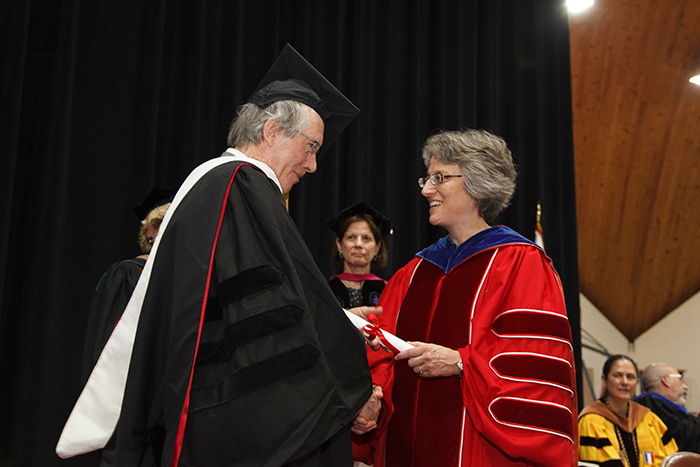Ian McEwan

COMMENCEMENT EXERCISES, MAY 17, 2015
Citation presented by Carol Ann Johnston
Professor of English
Conferring of the degree by Nancy A. Roseman, President
Ian McEwan, we honor you today for your devotion to the precision and clarity of the novel, novella, and short story forms.
Your mastery of these forms allows us insight into various worlds—those of science, law, World War I, the macabre, and the minds of women and men, to name a few.
Born in Aldershot, England, moving from Singapore to Germany to Libya with your military family, you received a B.A. in English at the University of Sussex. You earned an M.A. in English literature from our sister school, the University of East Anglia in Norwich, England. Your prize-winning propensity began with the Somerset Maugham Award in 1976 for your first short story collection First Love. Your books have been on the shortlist of the Man Booker Prize six times; you won the prize for Amsterdam in 1998. Atonement earned the WH Smith Literary Award (2002), the National Book Critics Circle Award (2003), the Los Angeles Times Prize for Fiction (2003), and the Santiago Prize for the European Novel (2004). Your novel Saturday won the James Tait Black Memorial Prize and On Chesil Beach was the Galaxy Book of the Year (2008). In 2000, your country named you Commander of the Most Excellent Order of the British Empire.
With your 21 books and many screenplays you have helped us to explore the boundaries between science and ethics. In the spirit of the liberal arts, you have mastered discourses as diverse as neuroscience and family law. In your desire to “[enter] the minds of others” you pursue the heartening combination of research and imagination. That research often occurs in archives. “An archive,” you have said, “takes you right to the heart of the literary creation; it makes for an emotional connection that anyone who loves literature will understand.”
You champion what you have called an “integrated education.” Much that is “exciting and challenging” about the sciences can “reinvigorate our understanding of human nature, which is integral to the study of the creative arts,” you have said. Further, the “fabulous and beautiful heritage of the arts—what has been imagined about our condition over the centuries—is a vital resource” for scientists. Historically, you have noted, scientists from Leonardo Da Vinci to E. O. Wilson “have written exquisitely about the world we share.” You believe that studying “essay based subject[s] like history or English” remains vital for scientists’ “ordering and articulating ideas.” Such a vision for an integrated education is at the heart of what we desire for our Dickinson graduates.
We admire your public stand on climate change in such forums as The Wall Street Journal: “Sunlight falls on us in a constant stream, a sweet rain of photons beyond counting,” you wrote, “A single photon striking a semi-conductor releases an electron, and so electricity is born […] These are the photovoltaics that Einstein described and for which he won a Nobel Prize. […] As is often pointed out, less than an hour’s worth of all the sunlight falling on the Earth would satisfy the whole world’s needs for a year. A fraction of our hot deserts could power our civilization.” A stirring call to action for today’s graduating class.
In this the 10th anniversary year of the Harold and Ethel L. Stellfox Visiting Scholars and Writers Program, we remember especially your acceptance of the first residency in 2005. As you read the passage from your novel Saturday describing a character’s tragic death in a pedestrian car accident, no eye in the hall remained dry. Jean Stellfox, the Dickinson alumna who endowed the residency, had herself died in such an accident a few years prior to your reading. During this first visit to Dickinson, you embraced all that Jean Stellfox imagined visiting writers would embody—a contagious passion for seeing the world clearly and for expressing that vision with gravity, pith, and force.
Madam President, for his achievements in the art of fiction, for his mastery of the manifold languages of our human condition, for his political responsibility, for his generosity, I am honored to present to you Mr. Ian McEwan for the honorary degree of Doctor of Letters.
*****************
Ian McEwan, upon the recommendation of the Faculty to the Board of Trustees, and by its mandamus, I confer upon you the Degree of Doctor of Letters, honoris causa, with all the rights, privileges, and distinction thereunto appertaining, in token of which I present you with this diploma and cause you to be invested with the hood of Dickinson College appropriate to the degree.
Honorary Degree Recipients